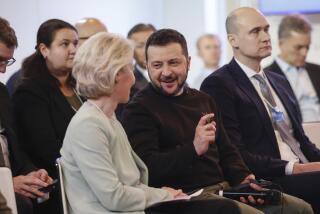Russia Pitches Its Frayed Economy to Western CEOs
- Share via
MOSCOW — They were statistics only a battle-weary prime minister could love: gross national product down only 4%, industrial production slumping just 3%, inflation holding steady at slightly more than 3% a month.
“At first glance, it may appear strange that this is being qualified almost as a success,” Prime Minister Viktor Chernomyrdin acknowledged.
Then, casting aside any such qualms, he told a group of foreign investors Monday that the statistics prove Russia is marching steadily toward economic stability and will not turn back--no matter how many reform-minded advisors drop out of government ranks along the way.
In a daylong forum with Western CEOs, Chernomyrdin sought to crank up international investment in Russia’s tattered economy by soothing foreign jitters. Yes, Communists and Nationalists have taken control of parliament. Yes, President Boris Yeltsin has junked a few reformist Cabinet members. Not to worry, the prime minister assured his guests.
“The reforms will [soon] start producing genuine, tangible results for the citizens of Russia,” Chernomyrdin said. “By the logic of history . . . there is no way back.”
Joined by several other Cabinet members, Chernomyrdin seized on foreign investment as a way to jump-start the economy without printing rubles.
“Considering that domestic [investments] are very limited during an economic crisis, the role of foreign investment is very big,” Economics Minister Yevgeny Yasin said. “We will have to work somehow to intensify this process.”
Already, the government has canceled several taxes on small businesses. And foreign-backed firms no longer have to pay customs duties on material imported into Russia for use during production. Auctions for short-term bonds will soon be opened to foreigners for the first time.
Finally, the government plans to revamp its privatization program to allow for fairer, more open auctions of state-owned enterprises.
Despite some tax reform, foreign investment last year totaled a disappointing $2 billion. Yasin said his personal goal is to double that sum every year through the turn of the century. He plans within the next year to open offices touting Russia’s investment opportunities in Frankfurt, Germany; Paris; London; and Milan, Italy.
*
But he might have trouble attracting U.S. dollars and German marks while Russia’s political turmoil continues, analysts warned. At the very least, investors might hold off until after the presidential elections in June, when reformers will face a strong challenge from Communists and Nationalists.
“Before the presidential elections, no one will make decisions on investing here, that’s absolutely clear,” said Sergei Pavlenko, director of the Center for Economic Reform.
More bullish on Russia’s future, investment manager Timothy Frost said he believes Western executives will decide they cannot afford to ignore an emerging market with 150 million potential customers.
After listening to the government’s presentation Monday, Frost said he believes Russia will continue to open up to foreign funds, despite the political posturing. Yeltsin addressed the Foreign Investment Advisory Council in the Kremlin, and his words “were particularly reassuring to many of the CEOs there,” Frost said.
“He was vigorous in his commitment [to reform], and he seemed forceful,” said Frost, president of the Pioneer First Voucher money management fund, which has 2.1 million Russian shareholders. “He was saying the things everyone wanted to hear, and I believe he was not just saying them because they were what people wanted to hear.”
But with presidential elections looming, Yeltsin’s government will face enormous pressure to woo voters with budget-busting Populist measures, such as raising pensions or compensating citizens who lost their life savings to inflation.
On Monday, for example, despite tough talk about an austerity budget, Chernomyrdin promised to provide additional housing for Russian soldiers. His decree directed the Finance Ministry to find funds for new apartment buildings--without specifying where the money would come from.
Meanwhile, teachers in St. Petersburg, Russia, launched a hunger strike to protest skimpy financing for their schools. The miners’ trade union demanded a meeting with Yeltsin to discuss their financial woes. And the government released figures showing that 25% of Russians fall below the poverty line, while the overall standard of living has dropped by a third.
*
All this came as Yeltsin stepped up his hints that he will run for reelection.
“It is very difficult and highly unpopular to be austere, especially in a presidential election year,” Chernomyrdin acknowledged. “But we have no other choice. It is the responsibility of the government to teach people--and if necessary, force them--to live within their means.”
His prognosis: “A very serious struggle lies ahead.”
More to Read
Sign up for Essential California
The most important California stories and recommendations in your inbox every morning.
You may occasionally receive promotional content from the Los Angeles Times.










